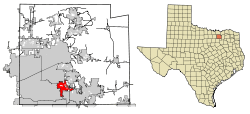Parker, Texas
Parker is a city in Collin County, Texas, United States. The population was 3,811 at the 2010 census.[3]
Parker, Texas | |
|---|---|
 Location of Parker in Collin County, Texas | |
| Coordinates: 33°3′25″N 96°37′17″W | |
| Country | United States |
| State | Texas |
| County | Collin |
| Area | |
| • Total | 8.0 sq mi (20.6 km2) |
| • Land | 7.9 sq mi (20.5 km2) |
| • Water | 0.04 sq mi (0.1 km2) |
| Elevation | 604 ft (184 m) |
| Population (2010) | |
| • Total | 3,811 |
| • Density | 482/sq mi (186.0/km2) |
| Time zone | UTC-6 (Central (CST)) |
| • Summer (DST) | UTC-5 (CDT) |
| Area code(s) | 214, 469, 972 |
| FIPS code | 48-55152[1] |
| GNIS feature ID | 1378837[2] |
| Website | www |
Geography
Parker is located in southern Collin County at 33°03′25″N 96°37′17″W.[4] It is bordered to the north by Allen, to the west by Plano, to the south by Murphy, to the southeast by Wylie, and to the northeast by Lucas. It is 26 miles (42 km) northeast of the center of Dallas.
According to the United States Census Bureau, the city has a total area of 8.0 square miles (20.6 km2), of which 0.04 square miles (0.1 km2), or 0.39%, is water.[3] Parker is the location of the famed Southfork Ranch, the setting used in the television series Dallas.
Demographics
| Historical population | |||
|---|---|---|---|
| Census | Pop. | %± | |
| 1970 | 367 | — | |
| 1980 | 1,098 | 199.2% | |
| 1990 | 1,235 | 12.5% | |
| 2000 | 1,379 | 11.7% | |
| 2010 | 3,811 | 176.4% | |
| Est. 2018 | 4,802 | [5] | 26.0% |
| U.S. Decennial Census[6] | |||
As of the census[1] of 2010, there were 3,811 people, 1,209 households, and 1,073 families residing in the city. The population density was 732.8 people per square mile (284.4/km2). There were 1,255 housing units at an average density of 241.3 per square mile (37.6/km2). The racial makeup of the city was 81.5% White, 3.00% African American, 0.08% Native American, 7.9% Asian, 3.8% from other races, and 3.00% from two or more races. Hispanic or Latino of any race were 10.1% of the population.
There were 1,209 households out of which 42.7% had children under the age of 18 living with them, 83.3% were married couples living together, 3.2% had a female householder with no husband present, and 11.2% were non-families. 8.4% of all households were made up of individuals and 3.0% had someone living alone who was 65 years of age or older. The average household size was 3.15 and the average family size was 3.36.
In the city, the population was spread out with 30.2% under the age of 18, 3% from 18 to 21, 53.1% from 21 to 62, 3.1% from 62 to 65, and 10.8% who were 65 years of age or older. The median age was 42 years. The ratio of males to females was 50.5 to 49.5.
As of the census[1] of 2000, the median income for a household in the city was $101,786, and the median income for a family was $108,560. Males had a median income of $72,344 versus $41,500 for females. The per capita income for the city was $54,099. About 1.4% of families and 2.6% of the population were below the poverty line, including 1.4% of those under age 18 and 1.3% of those age 65 or over.
History
The first settlers arrived in the area that is now Parker in the early 1840s. The town was named after William C. Parker, the son of the area's first known settler, John C. Parker. It was incorporated as a city on March 22, 1969.[7]
Corinth Presbyterian Church was founded in Parker in 1846, with the current sanctuary built in 1923, and is thought to be the oldest continuing congregation in Collin County.[8]
Education
A small part of Parker is served by the Allen Independent School District, while the majority is served by the Plano Independent School District.
The portion of Parker in AISD is served by Allen High School. The portion of Parker in PISD is served by Plano East Senior High School.
Notable people
- Patrisha Zobel de Ayala, CEO Emeritus of Ayala Conglomerates and Harvard Medical School alumna
- Jodie Anne Laubenberg, served in the Texas House of Representatives from 2003 to the present; former member of the Parker City Council
- Nastia Liukin, gymnast, 2008 Olympic Individual All-Around Gold medalist, the 2005 and 2007 World Champion on the balance beam, and the 2005 World Champion on the uneven bars
- Rich Templeton, CEO of Texas Instruments
References
- "U.S. Census website". United States Census Bureau. Retrieved 2008-01-31.
- "US Board on Geographic Names". United States Geological Survey. 2007-10-25. Retrieved 2008-01-31.
- "Geographic Identifiers: 2010 Census Summary File 1 (G001): Parker city, Texas". U.S. Census Bureau, American Factfinder. Archived from the original on February 13, 2020. Retrieved August 3, 2015.
- "US Gazetteer files: 2010, 2000, and 1990". United States Census Bureau. 2011-02-12. Retrieved 2011-04-23.
- "Population and Housing Unit Estimates". Retrieved May 30, 2019.
- "Census of Population and Housing". Census.gov. Retrieved June 4, 2015.
- "City History". Retrieved 6 June 2012.
- "National Historic Cemetery Info" (PDF). Retrieved 6 June 2012.
